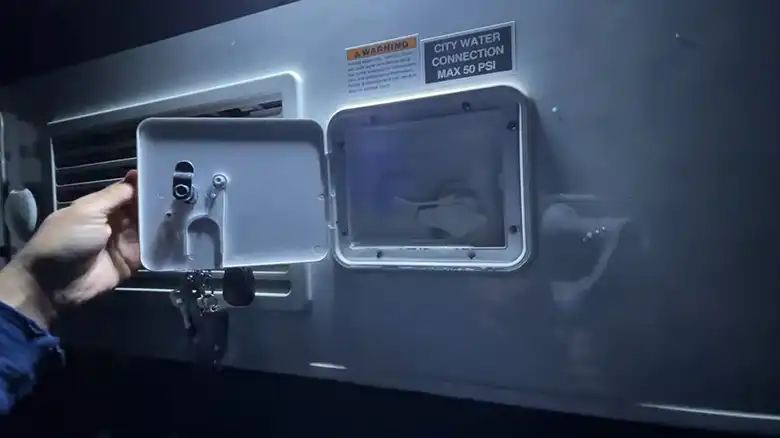Unpleasant sewer odors inside an RV after dumping waste tanks is a common issue that can dampen the adventure of RVing. Typically caused by problems in the black water, grey water, or general drainage systems, a bad “dump tank smell” emanating inside the RV indicates issues that need addressing. Learning the root causes, troubleshooting methods, fixes, and preventative measures will help resolve smelly RV dumping problems.
RV waste systems use holding tanks, vents, valves, and drainage pipes to cleanly manage and dispose of wastewater. Issues like dried out P-traps, overflowing grey tanks, faulty toilet seals, or clogged vents allow sewer gasses to enter the RV interior causing obnoxious sewage smells. Identifying the specific problem area through methodical diagnosis allows for targeted fixes. Proper dumping procedures, vigilant tank maintenance, sealing toilet gaskets, clearing vents, enzyme treatments, and professional help when needed will tackle nasty RV dumping odors. Continued prevention measures will stop bad smells from ever ruining another camping trip.

Common Causes of Sewer Smells in RVs After Dumping
RV sewer systems have to balance moving waste out while keeping smells in. Failures in containment from problems like worn seals, stuck valves, or disconnected vents then allows obnoxious sewer odors to permeate inside after dumping tanks. The specific culprits depend on which system has the issue – black tank, grey tank, or general drainage.
A. Black Water Tank Issues: The black water tank holds sewage waste from the RV toilet which undergoes anaerobic bacterial breakdown creating hydrogen sulfide gasses that smell like rotten eggs. When those gasses leak out from any points in the black tank’s infrastructure, it causes interior RV odors.
Specific black tank issues include:
- Improper dumping procedures like not flushing thoroughly can leave debris that rots and smells.
- Tank clogs happen when too much toilet paper or solid waste materials accumulate and block flow out. Solids decompose then smell.
- Lack of water from infrequent flushing or long storage drying out traps allows sewer gas venting.
- A full tank not promptly emptied at camps as needed builds up solids that cause odor.
- Disconnected, blocked, or broken vent pipes don’t direct escaping odorous gasses away properly.
B. Grey Water Tank Issues: While less smelly than sewage, the soapy grey water tank holding sink/shower drainage can also cause sewer odor issues from contamination.
Causes include:
- Excess food particles down drains that accumulate and decompose into smelly sludge.
- Clogged, kinked, or disconnected vent pipes don’t redirect gasses away.
- Overflowing grey tanks breached by clogged drains/pipes then vent inside.
C. Drainage System Issues: The RV drainage infrastructure carrying wastewater downhill to external dump points can also be compromised and leak sewer gasses inside if crucial components fail.
Issues stem from:
- Dehydrated P-traps that dry out and lose their water seals which contain odors.
- Vents/vent pipes getting obstructed by debris or animals which forces gasses indoors.
- Damaged tanks/pipes from age or impact then leak gasses inwards.
- Failed air admittance valves designed to only let air in, but then leak gasses out.
RV sewer smells after dumping most often arise from: toilet seal leaks, drained P-traps, full black tanks, vent obstructions, food-clogged grey tanks, or broken drainage pipes.
Diagnosing the Source of RV Sewer Odors
Pinning down precisely where RV sewage odors after dumping are coming from requires systematic diagnostics before fixing issues. Key steps include:
- Note exactly when smells occur- right after dumping, during driving, or random times indicating different root problems.
- Process of elimination starting from the black tank, then grey, then drainage pipes to isolate the issue origin.
- Thorough inspection of the toilet seals, flanges, valves for cracks and gaps.
- Checking all plumbing vents for obstructions or detachments from sewer pipes letting gasses leak rather than vent outside.
Meticulous odor troubleshooting traces smells back to the exact leaky component whether black tank vent, faulty toilet seal, or blocked sink drain to then target remedies.
Effective Solutions for Removing Sewer Smells in Your RV
With RV dumping odors isolated to the culpable system and component, targeted fixes can resolve each root cause for good.
A. Proper Dumping: Stopping improper dumping procedures causing black tank issues requires:
- Emptying at 3/4 tank level maximizes flushing flow to sluice solids out.
- Flushing several times until clear water flows ensures no debris remains.
- Using enzyme treatments regularly breaks down waste and paper better.
B. Maintain Toilet Seals: Keeping toilet seals leak-free long term involves:
- Regular cleaning to prevent seal-damaging buildup and cracks.
- Promptly replacing aged, warped seals before they leak sewer gasses.
C. Ensure Proper Ventilation: Getting clogged vents flowing freely mandates:
- Clearing external openings of insect nests or debris buildup.
- Securely attaching all internal vent pipe fittings so gasses don’t leak mid-route.
- Adding vent screens/filters that block insects but not airflow.
D. Reduce Grey Water Contamination: Stopping grey tank gunk requires:
- Using sink strainers and screens to catch food scraps before they go down drains.
- Avoid putting any food items down RV drains which can rot into smelly slime.
- Treating tanks periodically with enzymatic cleaners or baking soda.
E. Regular Tank Maintenance: Keeping all waste tanks fresh requires:
- Periodically flush with water to agitate and wash debris out.
- Deep cleaning tanks by pressure washing or chemical deodorizers as needed over time.
- Routinely inspecting drainage pipes for any buildup or blockages.
Vigilant adherence to proper dumping, venting, waste containment, and cleaning procedures resolves most RV sewage odor issues for good.
Preventing Sewer Smells from External RV Dumping
When camping among RVs, one neglected neighbor can ruin everyone’s day by dumping their tanks improperly and forcing their obnoxious sewage stench across all adjacent sites. Preventing such externally caused smells requires coordinating dumping etiquette among all nearby RV campers.
It helps to kindly inform newcomers if not aware of best practices like:
- Only emptying black tanks when wind blows away from other RVs.
- Adding tank enzyme treatments to minimize odors at source.
- Flushing grey tanks adequately after showers or sink use.
- Keeping toilet seals, drains, and vents well maintained.
With open communication, all nearby RV dump tank odor issues can stay contained. Multi-RV cooperation upholding simple sewer smell precautions keeps everyone’s camping experience fresh.
When to Call a Professional for RV Sewer Odor Issues
While many minor RV sewage smells resolve through vigilant monitoring and maintenance, more serious issues causing persistent bad odors warrant professional diagnosis and repair including:
- Detecting cracks or critical damage in tanks or drainage pipes leaking sewer gasses requiring replacement.
- Bad smells enduring after extensive individual troubleshooting of seals, vents, valves, and tanks likely indicates issues in need of expert inspection.
- Difficulty locating disconnected/detached vent pipes or tank parts hidden within RV underbelly may require pro assistance.
Seeking well-reviewed, certified RV technicians then utilizes specialized cameras, pressure testing, ventilation verification, and precision repairs to tackle severe dumping odor problems beyond standard self-maintenance capabilities.
Must-Have Supplies to Keep Your RV Free of Sewer Smells
Having the right gear, sealants, treatments, and tools ready lets RVers thoroughly deodorize their systems and stop smells at the source for less misery while enjoying travel adventures. Essential odor-fighting items include:
- Tank enzyme treatments to regularly break down waste which minimizes odor causing bacteria and hydrogen sulfide gasses. Popular brands are Happy Campers Holding Tank Treatment, Bio-Active Holding Tank Deodorizer, and Valterra Pure Power Blue Waste Digester.
- Tank deodorants like Bio-Active Holding Tank Deodorizer help neutralize existing noxious sewage gasses between tank flushings.
- Vent and drainage cleaning tools like tank wand scrub brushes, small grabber tools, hose attachments, and long vent brushes maintain flow and sanitize components.
- Toilet seal lubricants ease installation without tearing and have antiseptic properties to prevent seal deterioration and leaks.
Careful selection then routine use of such purpose-made dumping odor remedies boosts RV owner chances resolving problems themselves before they ruin any excursions.
People Also Ask (PAA)
Q: What is the most common cause of RV sewage smell inside after dumping tanks?
A: Damaged or dried out toilet gaskets and seals allowing black tank gasses to leak inside while driving or sitting. Vigilant toilet seal maintenance is crucial.
Q: Can bad dumping station equipment cause my RV to smell like sewage later?
A: Yes, cracked station fixtures or missing trap primers can splash wastewater elsewhere contaminating your RV underside with excess drippings smelling later especially while driving.
Q: Is it OK to keep RV black tank valves open all the time?
A: No, keeping knife valves open allows tanks to dry out and lose water seals so gasses then vent backwards inside when moving. Close knives except when flushing solids out while emptying.
Q: What cleaning schedule prevents severe sewage smells in RV tanks?
A: Treat black tanks monthly, grey tanks quarterly, and do thorough deep cleaning of all tanks annually as good hygiene prevents nasty lingering odors inside the RV.
Final Thoughts
Unpleasant sewery odors inside after dumping the RV is an annoying but solvable issue with attentive maintenance and cleaning of waste tanks, valves, vents, seals, and drainage pipes. Tracing odors to the root cause system then targeting fixes restores pleasant camping trips free of noxious black or grey water stenches ruining RV adventures. Consistent drain care prevents problems altogether proving proper sewer management keeps on the bright side of life in an RV.


